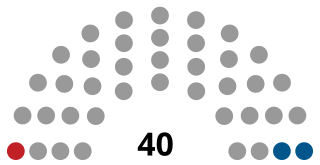
Politics of Bahrain has since 2002 taken place in a framework of a constitutional monarchy where the government is appointed by the King of Bahrain, King Hamad bin Isa Al Khalifa. The head of the government since 1971 has been Prime Minister Prince Khalifa bin Salman Al Khalifa and the Crown Prince is Prince Salman bin Hamad Al Khalifa, who also serves as deputy Commander of the Bahrain Defence Force. The parliament is a bi-cameral legislature, with the Council of Representatives elected by universal suffrage, and the Consultative Council appointed directly by the king.

Hamad bin Isa bin Salman al-Khalifa is the King of Bahrain. He has been the monarch of Bahrain since 6 March 1999, initially reigning as emir, and from 14 February 2002, as the first king. He is the son of Isa bin Salman Al Khalifa, the previous and first emir. The country has been ruled by the Al Khalifa dynasty since 1783.

Al-Wefaq National Islamic Society, or Al-Wefaq for short, is a Shia Bahraini political party. Although from 2006 to 2011 it was by far the single largest party in the Bahraini legislature, with 18 representatives in the 40-member Bahraini parliament, it was often outvoted by coalition blocs of opposition Sunni parties and independent MPs reflecting gerrymandering of electoral districts. On 27 February 2011, the 18 Al-Wefaq members of parliament submitted letters of resignation to protest regime violence against pro-reform Bahraini protestors.

Ali Salman Ahmed Salman is a Bahraini Twelver Shi'a cleric and the Secretary-General of the Al-Wefaq political society. In January 1995, the Bahraini government forcibly exiled him to Dubai for leading a popular campaign demanding the reinstatement of the constitution and the restoration of parliament during the 1990s Uprising. From there he made his way to London and sought asylum. He continued opposition activities from London, where he was associated with the Bahrain Freedom Movement. Salman returned to Bahrain in March 2001 in a general amnesty as part of a set of political reforms announced by King Hamad.

The Council of Representatives, sometimes translated as the "Chamber of Deputies", is the name given to the lower house of the Bahraini National Assembly, the national legislative body of Bahrain.

General elections were held in Bahrain in November and December 2006 to elect the forty members of the Council of Representatives. The first round of voting was held on 25 November, with a second round on 2 December 2006.
In the 2000s in Bahrain the government instituted political reforms and relaxed economic controls.

Hasan Mushaima is an opposition leader in Bahrain and the secretary-general of the Haq Movement, an important opposition party in Bahrain. Before forming Haq, he was a founding member of Al Wefaq and a leading figure in the 1994 uprising in Bahrain. He has campaigned for more democratic rights in Bahrain, and has been in prison in Bahrain since his arrest in 2011.

General elections were held in Bahrain in October 2010 to elect the forty members of the Council of Representatives. The first round of voting was held on 23 October, with a second round on 30 October. Amidst boycotts and arrests, Al Wefaq won 18 of the 40 seats. Four women were elected.

The Bahraini uprising of 2011 was a series of anti-government protests in Bahrain led by the Shia-dominant and some Sunni minority Bahraini Opposition from 2011 until 2014. The protests were inspired by the unrest of the 2011 Arab Spring and 2011–12 Iranian protests and escalated to daily clashes after the Bahraini government repressed the revolt with the support of Gulf Cooperation Council and Peninsula Shield Force. The Bahraini protests were a series of demonstrations, amounting to a sustained campaign of non-violent civil disobedience and later some violent resistance in the Persian Gulf country of Bahrain. As part of the revolutionary wave of protests in the Middle East and North Africa following the self-immolation of Mohamed Bouazizi in Tunisia, the Bahraini protests were initially aimed at achieving greater political freedom and equality for the majority Shia population, and expanded to a call to end the monarchy of Hamad bin Isa Al Khalifa following a deadly night raid on 17 February 2011 against protesters at the Pearl Roundabout in Manama, known locally as Bloody Thursday.
Coalition Youth of 14 Feb Revolution, sometimes called The Coalition is a Bahraini youth group, named after the date of the beginning of Bahrain's uprising, and led by anonymous individuals who organize protests chiefly via new-media sites. The Coalition first appeared on the popular pro-democracy forum Bahrain Online. Their Facebook page started in April 2011 where they have 65,282 likes. It is the main Facebook page that calls for daily peaceful demonstrations and protests. One of the first sub-groups called February 14 Youth was behind the call for demonstrations on February 14, 2011, named "Day of Rage" and developed later to a nationwide uprising. in 2017, the group has been designated as a terrorist organization by Bahrain, Saudi Arabia, United Arab Emirates and Egypt.
Mohamed Yousif Rashid Albuflasa is a Bahraini poet, writer, former independent candidate for the Bahraini Parliament in the 2010 Parliamentary elections and a member of the Bahraini youth parliament. He belongs to the Albuflasa Bedouin clan. Formerly a Bahrain Defence Force officer, he is now employed at the court of Crown Prince Salman bin Hamad bin Isa Al Khalifa.

Ali Jassim al-Ghanmi is a Bahraini former policeman who came to public attention for leaving his post and joining protesters in February 2011 of the Bahraini uprising (2011–present). On 9 January 2012, he was sentenced to 12 years' imprisonment.
The following is an incomplete timeline of events that followed the Bahraini uprising of 2011 from July to December 2011. This phase saw many popular protests, escalation in violence and the establishment of an independent government commission to look into the previous events.

The following is a timeline of the Bahraini uprising from February to March 2011, beginning with the start of protests on February 2011 and including the Saudi-backed crackdown from 15 March.

The "Day of Rage" is the name given by protesters in Bahrain to 14 February 2011, the first day of their national uprising. Inspired by the successful uprisings in Egypt and Tunisia, Bahraini youth organised protests using social media websites. They appealed to the Bahraini people "to take to the streets on Monday 14 February in a peaceful and orderly manner." The day had a symbolic value being the ninth and tenth anniversaries of the Constitution of 2002 and the National Action Charter respectively.
The background of the Bahraini uprising dates back to the beginning of the twentieth century. The Bahraini people have protested sporadically throughout the last decades demanding social, economic and political rights. Demonstrations were present as early as the 1920s and the first municipal election was held in 1926. Ruled by Al Khalifas since 1783, Bahrain was a British protectorate for most of the twentieth century. The National Union Committee (NUC) formed in 1954 was the earliest serious challenge to the status quo. Two year after its formation, NUC leaders were imprisoned and deported by authorities.
Tashan (Arabic:طشان) is a village located in the Kingdom of Bahrain, on the western outskirts of the capital city Manama. It is a village adjacent to Bilad Al Qadeem but significantly smaller.

General elections were held in Bahrain in November 2014 to elect the forty members of the Council of Representatives. The first round of voting took place on 22 November, with a second round on 29 November in the 34 constituencies in which no candidate received a majority.

General elections were held in Bahrain in November and December 2018 to elect the 40 members of the Council of Representatives. The first round of voting was on Saturday, 24 November, with a second round in 31 constituencies on Saturday, 1 December. A municipal poll coincided with the parliamentary vote.









